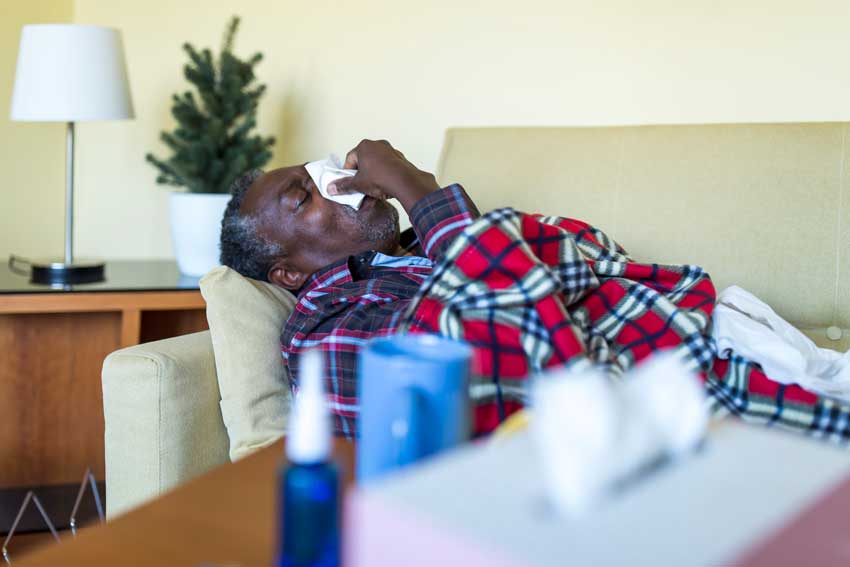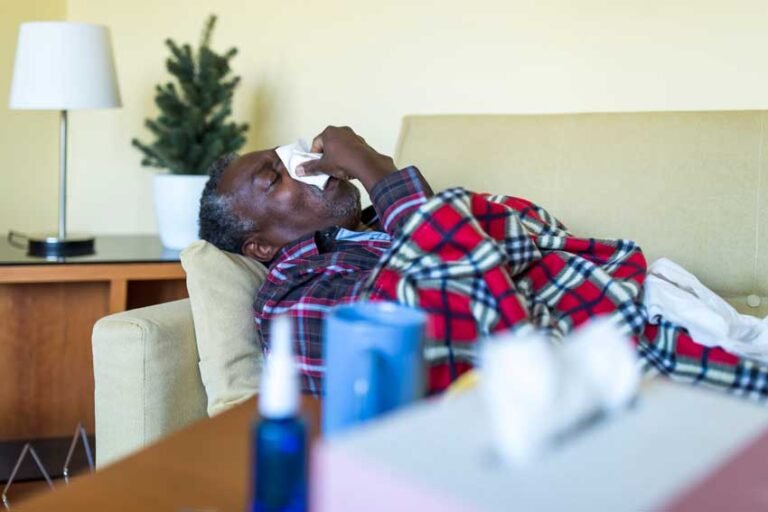
Respiratory syncytial virus, also known as RSV, is a common respiratory virus. Almost every child by the age of two is infected with RSV, and approximately 65 million people are affected each year.
For most people, RSV causes mild, cold-like symptoms that probably get better within a week or two. However, in other people, especially in high-risk groups such as infants and the elderly, RSV can be serious and even lead to hospitalization.
In more severe cases, RSV can cause bronchiolitis and pneumonia. It can also worsen chronic health problems such as asthma and congestive heart failure. Severe cases of RSV can also seriously affect your heart health. The good news for seniors is that new vaccines have been approved. (Keep reading for more details.)
Diagnosis of RSV and prevention of its spread
Many people think that RSV is a seasonal disease that begins in the fall and peaks in the winter. But COVID-19 has disrupted some of the predictability of 2020, leaving experts unsure of what the future holds.
RSV can be difficult to distinguish from other seasonal respiratory illnesses, such as the flu or cold, because they share many symptoms, such as coughing, sneezing, and stuffy nose. Your doctor may perform special tests to determine the details of your illness.
If you are an older patient with cardiovascular disease (CVD) or related risk factors and have respiratory symptoms, it is important to see a health care professional because you may have RSV infection. Your doctor can help you take steps to prevent the spread, manage your condition, and watch for worsening CVD symptoms that may require hospitalization.
Effects of RSV
In the United States alone, up to 160,000 adults are hospitalized each year for more severe cases of RSV. In more severe cases of RSV, there is a strong correlation between Rvirus and heart health.
Approximately 14-22% of adult patient admissions are complicated by cardiovascular conditions, such as exacerbation of congestive heart failure, acute coronary syndrome, or arrhythmia. Underlying cardiovascular disease is also associated with 45-63% of RSV hospitalizations in adults.
Are you at risk?
If you are an older adult or a chronically ill adult, you may face an increased risk of severe RSV and cardiovascular complications. People most at risk for RSV include:
- Adults over 60 years old
- Adults with weakened immune system
- Adults with chronic medical conditions such as lung disease, cardiovascular disease such as congestive heart failure or coronary artery disease, kidney disease, or neurological disease.
Diagnostic method
If you are infected with RSV, symptoms will probably appear within 4 to 6 days after infection. Symptoms include:
- snot
- decreased appetite
- cough
- sneeze
- heat
- wheezing
These symptoms usually appear in stages rather than all at once.
how you are treated
Most RSV infections clear up on their own within 1 to 2 weeks, so antiviral drugs are usually not recommended. However, there are things you can do to reduce symptoms.
Please drink plenty of water. Remember to drink plenty of water. It can prevent dehydration (loss of body fluids).
Reduce fever and pain Use over-the-counter fever reducers and pain relievers, such as acetaminophen or ibuprofen.
Please consult a medical professional If symptoms become severe. It is important to remember that RSV can cause severe symptoms in some people.
Complications caused by RSV
Although most cases of RSV remain mild, serious complications can occur. This includes worsening conditions such as bronchitis, pneumonia, asthma, chronic obstructive pulmonary disease, and congestive heart failure.
Studies show that up to 22% of hospitalized adults experience cardiovascular complications, including worsening congestive heart failure, new arrhythmias, and stroke.
Especially if you are a more vulnerable population, it is important to understand the increased risks you may face and how best to protect yourself and your loved ones.
RSV infection can be dangerous for certain adults. It is estimated that 60,000 to 160,000 adults over the age of 65 are hospitalized in the United States each year, and 6,000 to 10,000 of them die from RSV infection. Adults most at risk for severe RSV infection are:
- Elderly people, especially those over 65 years old
- Adults with chronic heart or lung disease
- Adults with weakened immune system
What you need to know about respiratory syncytial virus and heart health
If you have heart disease, it is important to take special care and consult a medical professional for advice. Severe cases of RSV can be complicated by cardiovascular disease, leading to hospitalization and death.
Studies have shown that up to 63% of adults hospitalized with RSV have underlying cardiovascular disease. Additionally, 14-22% of adult patients hospitalized with RSV have cardiovascular complications such as worsening congestive heart failure, acute coronary syndrome, and arrhythmias.
Researchers believe that RSV primarily affects cardiovascular health through the airways.
RSV is also thought to be associated with myocardial damage. It can also cause an increased risk of ischemia (insufficient blood supply to the heart) and atrial fibrillation (irregular, fast heartbeat).
cardiovascular complications
RSV is thought to be associated with worsening of cardiovascular diseases, including arrhythmias, heart failure, and heart attacks, both in patients with and without a diagnosis of these diseases.
- heart attack and stroke – Patients are at increased risk of heart attack or stroke immediately after being infected with RSV. The risk is highest within three days of infection, but continues to increase for up to 90 days.
- congestive heart failure – Adults infected with CHF and RSV are more likely to require hospital treatment. Researchers found that patients with CHF were eight times more likely to be hospitalized than those without CHF. And more than 5% of his total CHF hospitalizations during RSV season are due to her RSV infection. The news is even worse for the elderly. One study found that 20% of elderly patients hospitalized for RSV were diagnosed with CHF when they were first discharged.
- coronary artery disease – Although RSV patients have been found to have a higher prevalence of underlying CAD, one study found that these patients were more likely to receive outpatient treatment than inpatient treatment.
In case of serious infection
Adults who get RSV infection usually have mild cold-like symptoms, but they can also develop a lung infection or pneumonia. RSV can also cause severe worsening of symptoms, including:
- asthma
- Chronic obstructive pulmonary disease (COPD) – chronic disease of the lungs that causes difficulty breathing
- Congestive heart failure – when the heart is unable to pump enough blood and oxygen around the body
Elderly people who develop severe symptoms from RSV may require hospitalization. Some people may die. Elderly people are at greater risk of serious complications from RSV than younger adults because their immune systems weaken as they age.
Avoiding RS virus
There are some simple steps you can take to stay healthy and avoid RSV.
wash hands. Use soap and water or an alcohol-based hand sanitizer.
Avoid touching your face with unwashed hands. This is how we spread germs.
Stay away from sick people. If you have cold-like symptoms, don’t kiss or share cups or utensils with friends or family.
Cover your coughs and sneezes. Need to cough or sneeze? Always cover your mouth and nose with a tissue or shirt sleeve. Of course, throw the tissue in the trash.
Beautiful, beautiful, beautiful! Remember to clean and disinfect frequently touched surfaces and objects, such as toys, doorknobs, and mobile devices. This will help get rid of bacteria.
Feeling unwell? stay at home. You don’t want to infect others with your illness. Protect those around you by avoiding work, school, and public places.
Feeling unwell? Read the do’s and don’ts to help yourself recover and protect others if you get the virus.
Promising new vaccine
Two new vaccines were recently approved by the Food and Drug Administration and recommended by the Centers for Disease Control and Prevention for adults age 60 and older. Available now at many retailers.
Studies have shown that one dose can reduce the risk of symptomatic disease by 83% and the risk of severe disease by 94%. Vaccination is especially important for elderly patients with cardiopulmonary diseases.
If you have questions about the RSV vaccine, please consult your health care professional.


